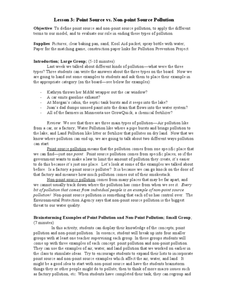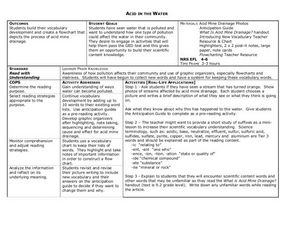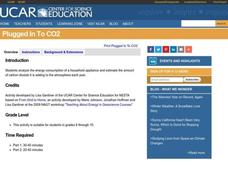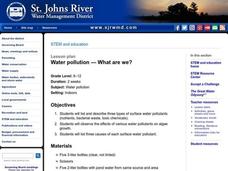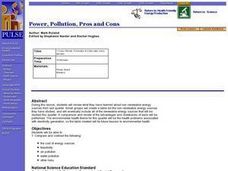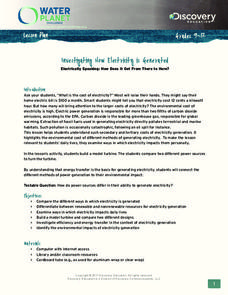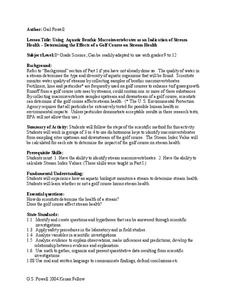Curated OER
Point Source vs. Non-point Source Pollution
Young scholars define and differentiate between point source and non-point source pollution. Students discuss various types of pollution including air, water and land pollution, analyze demonstrations and complete a worksheet.
Teach Engineering
Introduction to Environmental Engineering
A series on environmental engineering introduces the class to issues that environmental engineers work to solve. This first instructional activity focuses on air and land issues, and looks at ways to reduce pollution.
Curated OER
Acid in the Water
Ninth graders learn about the effect pollution has on water and how this affects their community. In this environmental awareness lesson, 9th graders expand their vocabulary and create a flowchart that demonstrates the process of acid...
Center Science Education
Plugged In To CO2
Watt is going on here? Middle schoolers are learning about energy use and carbon dioxide emissions! In the first part of this lesson, learners measure how much energy different appliances consume and calculate the amount per day. In the...
Carnegie Mellon University
Understanding Electricity Mix Tradeoffs
Use the accompanying presentation and colorful technology sheets to introduce your class to the 10 different energy technologies. Connect kids to an interactive computer tool that allows them to combine different types of power...
Curated OER
What Are We?
Students list and describe three types of surface water pollutants. They observe the effects of various water pollutants on algae growth. Three causes of each surface water pollutant is listed.
Curated OER
Air Pollution
In this air pollution worksheet, students complete a crossword puzzle by reviewing the different types and sources of air pollution. This worksheet has 13 terms to place into the puzzle.
Curated OER
Water Filtration Competition
Students design water filtration systems. They draw sketches and write paragraphs about their systems. After presenting their systems to the class, each group then builds their system and determines its effectiveness for purifying...
Curated OER
The New Haven Oyster Industry and Water Quality
Young scholars examine the different types of water pollutants and how they affect the waterways. In this environmental science lesson, students collect and interpret data from government agencies. They discuss how industrial development...
Curated OER
What's In Your Stream?
Learners conduct hands-on fieldwork in order to investigate water quality of a nearby stream. They discuss watersheds and how it affects water quality as well as identify any causes of changes or pollution in the area water before...
Curated OER
Stream Table
Students explore channelization, riparian habitats and soil erosion to find out about the aquatic habitats in Iowa. In this aquatic habitats lesson, students define important terms and read an article about pollution. Students complete...
Curated OER
Waste Not, Want Not
Students consider the types of debris that litters beaches and conduct research on waste management. They then interview professionals in a particular field of waste management and write reports for a booklet about garbage and sewage to...
University of Florida
Protecting Our Water Resources
Teach young environmentalists to protect their planet's resources with a set of interactive experiments. Kindergartners and other youngsters learn about watersheds and the water cycle, while older elementary learners focus on fertilizer...
Teach Engineering
Where Are the Plastics Near Me? (Field Trip)
With a piece of plastic here and a piece of plastic there, here a piece, there a piece, everywhere a piece. Teams go on a field trip in order to document the locations and kinds of plastic trash in an area near them. The eighth...
California Academy of Science
Building Better Buses: Transportation Design Challenges
Scholars learn about a series of three challenges when they design a bus system for a small town. They determine the bus routes and then figure out the best type of fuel to use before considering the cost of going electric. Learners...
Curated OER
Power, Pollution, Pros and Cons
Students review what they know about non-renewable energy, compare and contrast advantages and drawbacks of each type, such as cost of energy sources, feasibility, air pollution, water pollution, and other risks, and create table listing...
EarthEcho International
Investigating How Electricity is Generated
What is the real cost of electricity? The real cost is not just the price you pay, but the environmental and economic costs as well. Scholars build, use, and judge the effectiveness of a turbine. They also investigate the environmental...
Curated OER
Coco Locomotion
Technology tutees read a description about coconuts and how they are used to make biodiesel fuel. Note that the link to the article does not work, and the article does not appear to be available online. There are, if you look for one,...
Curated OER
Maintaining a Healthy Environment
For this healthy environment worksheet, students describe different types of pollutants in the environment including smog, acid rain, and ozone. This worksheet has 1 drawing and 5 short answer questions.
Polar Trec
Why Can’t I Eat This Fish?
Can turning on the television lead to toxins in the food supply? The lesson offers an opportunity for young scientists to complete guided research. A worksheet lists each question as well as the web page necessary to answer the question....
Kenan Fellows
Determining the Effects of a Golf Course on Stream Health
Do golf courses affect the water organisms in nearby streams and ponds? Small groups collect samples of water upstream and downstream from a golf course and analyze the macroinvertebrates found and the stream index values of the two...
Redefining Progress
Have and Have-Not
Is there a correlation between a country's wealth and the extent of its ecological footprint? What exactly constitutes an ecological footprint, and how does one country stack up against the rest? This is a unique lesson to incorporate...
Kenan Fellows
Microorganisms in Pond Water
That is living in the water? Groups of two to three view pond water with microscopes in order to find microorganisms. They draw pictures of the ones they find in their slides. The groups compare their drawings to pictures of common pond...
Chymist
Landfills and Recycling
Examine the nature of landfills through experimentation. Scholars build miniature landfills and monitor changes over a six-week period. Observations allow individuals to draw conclusions about the different types of trash and their...


